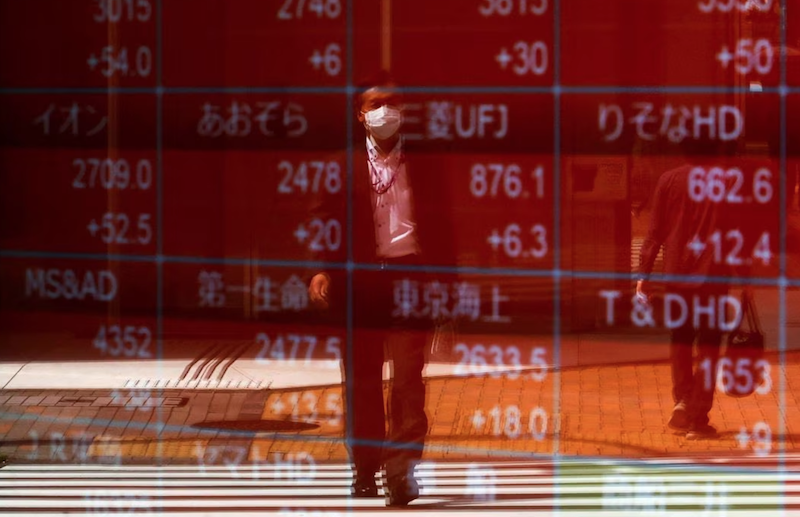Asia’s major stock indexes were in retreat on Friday, as the threat of inflation reared its head again and with it the likelihood of more rate rises in the months ahead.
Shares across the region were on course for their steepest one-day percentage decline in a week, after stronger-than-expected US consumer prices figures bolstered the case for the Federal Reserve to keep rates higher for longer – dashing growing hopes that central banks were ready to roll back rates soon.
Japanese shares fell, tracking Wall Street’s declines overnight after the hotter-than-expected US inflation data fuelled bets for a more hawkish Fed.
Also on AF: China Births Slump to Record Low, Prompting Economic Warnings
However, losses on Japan’s benchmark Nikkei share average were limited by a 5.75% surge in heavyweight Fast Retailing, owner of the Uniqlo brand, following a strong earnings report.
The Nikkei closed the day down 0.55% at 32,315.99, snapping a three-day winning run. Of the Nikkei’s 225 components, only 15 were higher, with 208 falling and two flat. The broader Topix index slumped 1.44%.
Even with Friday’s sizeable selloff, the Nikkei still gained 4.26% for the week, snapping a three-week losing run.
Chinese stocks fell after consumer price data suggested domestic demand is still under pressure, although export data was better than expected.
China’s blue-chip CSI300 Index dropped 1.05%, while the Shanghai Composite Index lost 0.64%, or 19.80 points, to close at 3,088.10. The Shenzhen Composite Index on China’s second exchange dropped back 0.79%, or 15.16 points, to 1,905.41.
Meanwhile, China’s exports for September shrank 6.2% from a year earlier, while imports also declined 6.2%, both contracting at a slower pace. Export data came in better than a Reuters poll forecast of a fall of 7.6%.
And Chinese stocks were still under pressure after the media reported that the country is considering creating a state-backed stabilisation fund to shore up confidence in its equity markets.
Middle East Tensions Weigh
Hong Kong shares also slipped, dragged down by its tech stocks. The territory’s benchmark Hang Seng Index slumped 2.33%, or 424.76 points, to 17,813.45.
Elsewhere across the region, in earlier trade, Singapore, Mumbai, Seoul, Sydney, Jakarta, Taipei and Wellington were also in the red. MSCI’s broadest index of Asia-Pacific shares outside Japan fell 1.2%, having scaled a three-week peak on Thursday.
The sour mood was set to continue in Europe, with Eurostoxx 50 futures down 0.19%, German DAX futures losing 0.14% and FTSE futures 0.05% lower.
The increase in US consumer prices for September contained a surprise surge in rental costs and traders now see a stronger chance that the Fed will end up delivering another hike this year.
The inflation report, along with poor demand for an auction of US 30-year bonds, sent Treasury yields higher on Thursday. In Asian hours on Friday, the yield on 10-year Treasury notes was down 4.1 basis points at 4.670% but remained far off the two-week low of 4.5300% it touched a day earlier.
Recent gains in stocks and a slide in Treasury yields had followed comments from Federal Reserve officials suggesting that US interest rates, which tend to drive global borrowing costs, may have finally peaked.
The week’s sharp escalation of Middle East tensions has also ensured the mood remains cautious across markets.
Yen Under Pressure Again
The risk-off mood also prevailed in the currency market, with the dollar holding on to overnight gains. Against a basket of currencies, the dollar eased 0.103% to 106.40, having gained 0.8% overnight.
The euro climbed 0.19% to $1.0548, while sterling was at $1.2204, up 0.24%. The dollar’s ascent has again put the Japanese yen under pressure, with the yen at 149.60 per dollar.
Gold prices edged up on Friday but remained below two-week highs hit in the previous session. Spot gold added 0.4% to $1,876.79 an ounce.
Oil prices rose on Friday after the US tightened its sanctions programme against Russian crude exports, raising supply concerns in an already tight market. US crude advanced 0.95% to $83.70 per barrel and Brent was at $86.66, up 0.77% on the day.
Brent is set for a weekly gain of over 2%, while WTI is set to climb about 1% for the week as investors keep a wary eye on the potential for disruptions to Middle Eastern exports due to the Gaza crisis.
Key figures
Tokyo – Nikkei 225 < DOWN 0.55% at 32,315.99 (close)
Hong Kong – Hang Seng Index < DOWN 2.33% at 17,813.45 (close)
Shanghai – Composite < DOWN 0.64% at 3,088.10 (close)
London – FTSE 100 < DOWN 0.05% at 7,640.94 (0936 BST)
New York – Dow < DOWN 0.51% at 33,631.14 (Thursday close)
- Reuters with additional editing by Sean O’Meara
Read more:
China’s Trade Data Slightly Better in September, Customs Says
China Curbs Brokerage Accounts in Bid to Stop Capital Outflows
Indian Regulator Seen Probing Adani’s Ties With Gulf Asia Fund
Hang Seng Lifted by Banks Boost, Bargain-Buyers Drive Nikkei
























